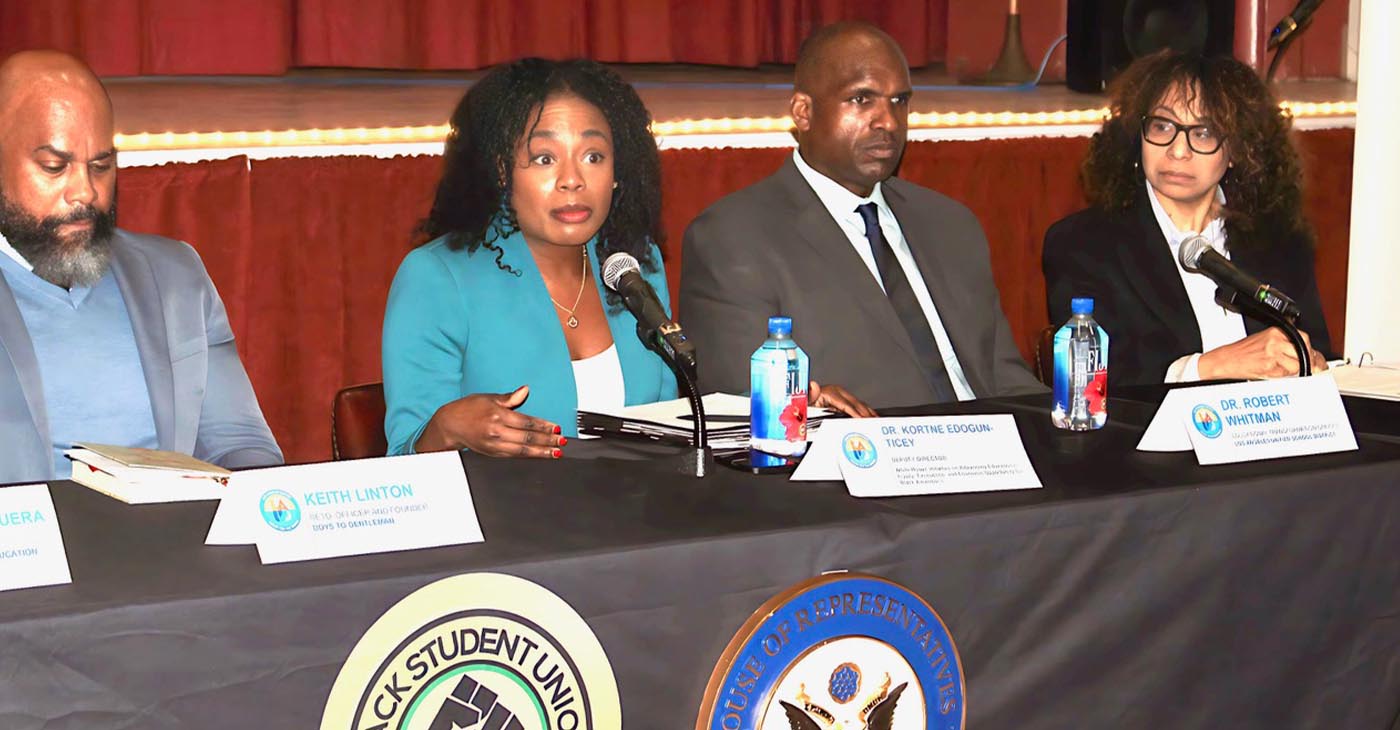California Black Media
U.S. Rep. Kamlager-Dove Leads Discussion on Improving Black Student Learning, Test Scores
On April 8, U.S. Congressmember Sydney Kamlager-Dove (D-CA-37) moderated a roundtable focused on Los Angeles Unified School District’s (LAUSD) strategies to improve Black student performance in classrooms. Kamlager-Dove, who represents a district that covers parts of Los Angeles County, hopes that ideas shared at the event can be incorporated into models that can impact other regions across California, where Black students continue to fall behind their peers of other races and ethnicities.

By Lila Brown, California Black Media
On April 8, U.S. Congressmember Sydney Kamlager-Dove (D-CA-37) moderated a roundtable focused on Los Angeles Unified School District’s (LAUSD) strategies to improve Black student performance in classrooms.
Kamlager-Dove, who represents a district that covers parts of Los Angeles County, hopes that ideas shared at the event can be incorporated into models that can impact other regions across California, where Black students continue to fall behind their peers of other races and ethnicities.
Discussions at the event centered on LAUSD’s Black Student Achievement Plan (BSAP) and other educational initiatives aimed at enhancing learning and boosting test scores.
“The Black Student Achievement Plan is unique in that it takes a community-centered approach to uplifting Black students,” said Kamlager-Dove during the event held at John Muir Middle School in Los Angeles.
“We must implement culturally responsive education in the classroom to challenge our students academically while giving them a sense of purpose,” she continued.
In 2023, nearly 70% of Black children in California fell below a passing mark on the state standardized English Language Arts exam, and only about 20% of those students were performing at grade level based on their scores on the math assessment test.
A variety of public education experts joined Kamlager on the panel, including Dr. Kortne Edogun-Ticey, Senior Advisor, U.S. Department of Education; Dr. Robert Whitman, Educational Transformation Officer at LAUSD; Dr. Pedro Noguera, Professor and Dean at the University of Southern California Rossier School of Education; and Keith Linton, founder of the non-profit Boys to Gentlemen.
Jonathan McGee, a student who sits on the BSAP Student Advisory Council, also spoke during the panel.
The BSAP was approved by the LAUSD Board of Education in February of the 2020-21 school year. Funds have been earmarked to address the longstanding disparities in educational outcomes between Black students and their non-Black peers. Dating back to the landmark case, Brown v. the Board of Education of Topeka, Kan., in which the U.S. Supreme Court declared that segregated schools were unconstitutional, positive outcomes for Black students continue to lag behind district and national averages for their non-Black counterparts.
Edogun-Ticey spoke about broader investments the federal government is making in education that directly impact Black students through The White House Initiative on Advancing Educational Equity, Excellence, and Economic Opportunity for Black Americans.
‘This administration did not shy away from the idea that we need resources for support which means billions of dollars in investment for HBCUs,” she explained.
BSAP strategies include partnering with Black families and local community; supporting the implementation of culturally and linguistically responsive and anti-racist practices; offering wrap-around support structures; and highlighting experiences that uplift the contributions of the Black community as motivation and models to develop positive Black student identity. Additionally, the BSAP provides increased staffing to support Black students’ academic and social-emotional needs.
“School districts across the country must push back against attacks on marginalized students by implementing programs like the BSAP, which should serve as a model for future initiatives,” Kamlager said.
Activism
Oakland Post: Week of July 24 – 30, 2024
The printed Weekly Edition of the Oakland Post: Week of July 24 – 30, 2024

To enlarge your view of this issue, use the slider, magnifying glass icon or full page icon in the lower right corner of the browser window. ![]()
Activism
Oakland Post: Week of July 17 -23, 2024
The printed Weekly Edition of the Oakland Post: Week of July 17 -23, 2024

To enlarge your view of this issue, use the slider, magnifying glass icon or full page icon in the lower right corner of the browser window. ![]()
California Black Media
New California Laws Require High School Classes on Drug Education, Financial Literacy and Ethnic Studies
Last week, California became the 26th state to require high school seniors to pass courses focused on finance literacy, coming behind recently added ethnic studies prerequisite and a health class requirement focused on the dangers of fentanyl use. The senior class of 2031 will be the first group of students to take the mandatory financial literacy course. California school districts are required to implement Assembly Bill 2927, authored by Assemblymember Kevin McCarty (D-Sacramento), at the beginning of the 2027-2028 academic year.

By Bo Tefu
California Black Media
Last week, California became the 26th state to require high school seniors to pass courses focused on finance literacy, coming behind recently added ethnic studies prerequisite and a health class requirement focused on the dangers of fentanyl use.
The senior class of 2031 will be the first group of students to take the mandatory financial literacy course. California school districts are required to implement Assembly Bill 2927, authored by Assemblymember Kevin McCarty (D-Sacramento), at the beginning of the 2027-2028 academic year.
The bill works hand-in-hand with newly approved Assembly Bill 2429, authored by Assemblymember David Alvarez (D-San Diego). That law requires students to take health classes that discuss the dangers of fentanyl use and illegal drugs commencing in the 2026-2027 school year.
Both bills require high school seniors to complete the designated coursework during any semester between the ninth and 12th grades. High school students in charter schools are also required to complete the state-mandated coursework. Under this law, local educational agencies will impose the required courses using state-mandated local programs.
McCarty said that the financial literacy classes will prepare students for the future and empower them to make smart money decisions throughout life.
“It’s such an important life skill,” he said. “The stressors that young people face today — especially student loans, renting, buying a house, credit cards all those things are so critically important. And if you fall behind, the consequences have a serious impact later in life.”
Unlike the bill on financial literacy that imposes classes as a graduation requirement, the bill on health education allows school districts to choose if health classes are a graduation prerequisite.
Alvarez said that health education can help address the state’s fentanyl epidemic, specifically among the youth.
“I think it’s important… that we share facts with young people, especially these days as they rely more and more on social media with misinformation,” said Alvarez.
“There’s still no better-trusted source than our schools for students and for families to receive the information that they need in order to make better decisions and better choices,” he continued.
Gov. Gavin Newsom said the state needs to help prepare young people in a statement backing the bills.
“Saving for the future, making investments, and spending wisely are lifelong skills that young adults need to learn before they start their careers, not after,” the Governor said in statement backing the education bills.
Starting in the 2025-2026 academic year, the state will also require high school seniors to take an additional one-semester course on ethnic studies.
-

 Arts and Culture3 weeks ago
Arts and Culture3 weeks agoRooted in Tradition: The Intricate History of Black Hair Braiding
-

 Bay Area4 weeks ago
Bay Area4 weeks ago“I Will Not Be Bullied,” Says Oakland Mayor Sheng Thao
-

 Bay Area2 weeks ago
Bay Area2 weeks agoPG&E Increases Rates While Bay Area Households Are Struggling to Stay Afloat
-

 Business3 weeks ago
Business3 weeks agoGov Newsom: Raising Fast Food Minimum Wage to $20 Pays Off as Jobs Multiply in Industry
-

 Activism4 weeks ago
Activism4 weeks agoOpponents of Mayor Sheng Thao Are Calling on Her to Resign Following FBI Raid
-

 Community1 week ago
Community1 week agoHundreds Come to Jehovah’s Witnesses’ Assembly Hall for Three-Day Program of ‘Good News’ in Fremont
-

 Bay Area2 weeks ago
Bay Area2 weeks agoJuneteenth Mass Shooting Suspect Charge with Multiple Counts of Felony Assault by Alameda County DA Pamela Price
-

 Activism4 weeks ago
Activism4 weeks agoOakland Coliseum Sale to AASEG: A Model for Community Development and Inclusion


















































